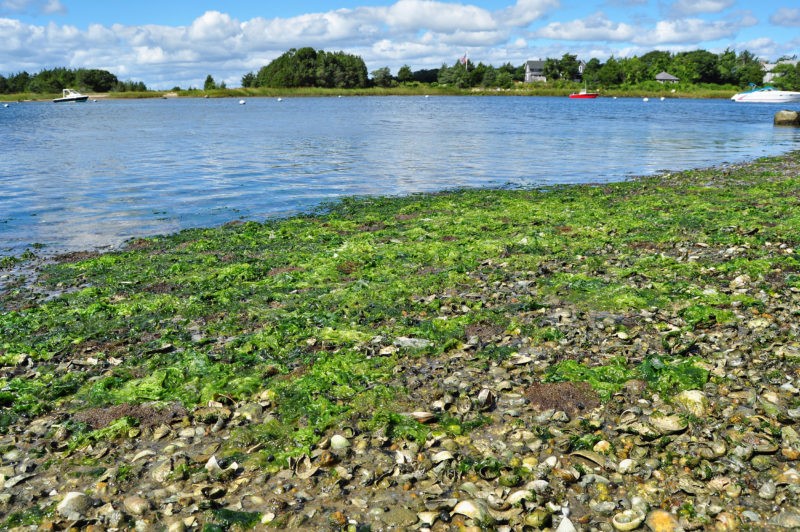Septic system upgrades in West Falmouth will demonstrate new nitrogen-reducing technologies at fire station, theatre company
Two upcoming septic system upgrades on West Falmouth Harbor – at the West Falmouth Fire Station and the College Light Opera Company campus – will deploy new state-of-the-art technologies to reduce nitrogen pollution as part of the Coalition’s ongoing effort to help restore the harbor’s health.

Nitrogen pollution fuels the growth of algae, which can wash up on beaches as slimy green muck.
Since 2015, the Coalition has been working with the town of Falmouth to demonstrate workable solutions to nitrogen pollution from septic systems, which are now the largest source of this harmful pollutant to West Falmouth Harbor. Nitrogen pollution fuels the growth of algae and has led to the loss of underwater eelgrass beds and fish and shellfish populations in the harbor.
As part of this project, the Coalition has been upgrading septic systems on West Falmouth Harbor and installing various nitrogen-reducing technologies. Most homes around the harbor use traditional on-site septic systems and cesspools, which do not remove nitrogen from wastewater. The first phase of this demonstration project resulted in a 78% reduction in nitrogen pollution from 20 upgraded septic systems.
We’re now working with the town to upgrade 10 more systems around West Falmouth Harbor as part of Phase 2 of this effort. These systems are introducing different nitrogen-reducing technologies to give homeowners more choice. There are many types of nitrogen-reducing septic systems available today – which was not the case even a few years ago.
Two of the newest upgrades will use two versions of a system that have been shown to reduce nitrogen by an estimated 95% compared to traditional septic systems in demonstrations on Martha’s Vineyard and at the Massachusetts Alternative Septic System Test Center.
One is taking place at the West Falmouth Fire Station, where the town has committed to installing a nitrogen-reducing septic system instead of a traditional Title 5 system that does not remove nitrogen. The fire station will use a system called NitROE®, which has a separate denitrification tank that’s installed between the septic tank and the leach field. The NitROE® tank aerates wastewater and then uses wood chips to remove nitrogen before the wastewater flows to the leach field. Because the system uses a supplemental tank to remove nitrogen, it’s a potential option for single-family homeowners who want to retrofit their existing Title 5 system.
The other exciting upgrade is taking place at the campus of the College Light Opera Company (CLOC) on Harbor Head in West Falmouth. Approximately 90 students live on the four-building campus each summer, performing operettas and musicals at nearby Highfield Theatre throughout the season. It’s the largest resident theatre company in the United States.
CLOC’s campus currently has four cesspools and two Title 5 systems that collect wastewater from the various buildings. The new nitrogen-reducing system, called SanTOE®, will replace all of those polluting systems with one main system that treats wastewater from the entire campus. The SanTOE® system uses a similar process as NitROE® to remove nitrogen – but wastewater moves through four separate beds instead of a supplemental tank, which allows the SanTOE® system to handle larger flows than single-family homes. This upgrade will demonstrate SanTOE®’s performance in a small, seasonal community, which could offer a promising option for other small communities that need to upgrade their wastewater treatment.
These two systems are expected to be installed next spring. Once complete, they’ll demonstrate more solutions to nitrogen pollution for residents in West Falmouth and beyond to protect and restore Buzzards Bay’s health.